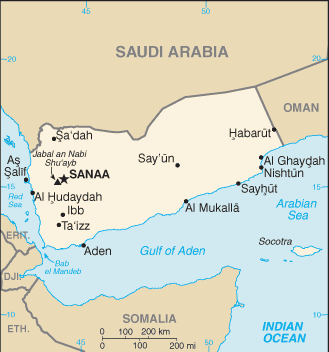Pentagon officials have been making clear for weeks that they are eager to directly join Saudi Arabia’s war in Yemen, and have excitedly laid out plans for deeper involvement in the conflict to the rest of the administration, centering on joining the invasion of Hodeidah, a Red Sea port which is where most humanitarian aid enters the country.
 Hodeidah’s vitalness to the already shaky aid supply to northern Yemen isn’t sitting well with aid workers, or even with State Department and USAID officials, who were quick to note that cutting off Hodeidah to the northern Yemenis would lead directly to a full-blown famine.
Hodeidah’s vitalness to the already shaky aid supply to northern Yemen isn’t sitting well with aid workers, or even with State Department and USAID officials, who were quick to note that cutting off Hodeidah to the northern Yemenis would lead directly to a full-blown famine.
Officially, the Pentagon is just denying the famine risk out of hand, claiming that the invasion would be “clean,” and that they could deliver the port to the Saudis in just a few weeks. The assumption is that the aid would resume immediately, though in practice the reason Hodeidah is the only port for the rebel north is that the Saudis have prevented aid from moving through their ports into the north, and with Hodeidah would be able to do so even more.
Mass starvation in Yemen’s Shi’ite dominated north is likely the point from Saudi Arabia’s perspective of being so interested in attack Hodeidah, as they’ve been bombing port infrastructure there throughout the war to limit food deliveries. The reason for the Pentagon’s interest in joining this particular offensive is unknown.





We are collaborating in a war crime.
The Saudis have already caused 60,000 malnutrition related deaths above the 10,000 combat deaths with their starvation blockade. If they take the port ‘cleanly’ no food will make it into Houthi controlled areas. The KSA already controls other ports into Yemen and food only gets into Hadi country. This violates article 3 of the Geneva Convention.
God will punish us for this. We boast in our weapons of war but they are nothing in His sight. As Lincoln said, both sides pray to the same God for different outcomes but God has His own purposes. Translation, God doesn’t wear an American Flag on His lapel.
I agree with most of your statement that this is a war crime. The pentagon doesn’t have the right to invade Yemen under the original AUMF because none of the countries involved in Yemen had anything to do with 9/11. Except for Saudi Arabia who had government officials financing the terrorists which our government hid from us for 16 years.
I disagree that God is going to punish us, he has been AWOL for over 200 years of Americans invading countries and starting with the genocide of the Native American.
It’s much more than just war crimes. It’s a genocide committed by Saudis in Yemen. USA supports and collaborates with this genocide.
Exactly, this is why the U.S. govt has ZERO credibility when they talk or accuse others of the very crimes they and their puppets commit. Next time Nikki Haley opens her big rotten mouth at the UN and tries to hold up dead babies, etc., the entire UN should stand up with pictures of all the dead kids her govt and the Saudis have committed in Yemen, Iraq, Libya, and Syria.